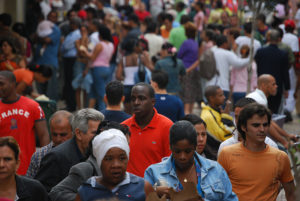If we draw comparisons between the political climate in the late 19th century, Cuba at the end of Batista’s dictatorship, and our current situation, we will find lots of similarities.
During all three of these times, the island suffered a tyrannical power which restricted its political and economic freedoms, as it was more interested in upholding its status quo than encouraging progress.
During all three of these times, there were also strong indications that this power was in its last moments and standing dangerously on the brink of its collapse, already established by using repressive force and absolute social control, without anything new to offer other than its own extinction.
During all three of these times, the power was left out of step with the times by humankind’s own evolution, thereby proving its absolutism and stark blindness.
Some men in the 19th century opted for leading an armed struggle against the opressor and they imposed this on the rest of the country. This resulted in horrific devastation and the even more horrific loss of hundreds of thousands lives, hundreds of thousands, where they were from was irrelevant. Wouldn’t it have been better to have waited for things to have evolved better, with the obvious decline of the Spanish empire, building political pressure internally and pressure from the US’ emerging Imperialism? I don’t know and we’ll never know now.
In the ‘50s, other people chose the same path against Batista and they imposed their armed struggle on the rest of the population which rekindled the dictatorship’s repressive violence and caused thousands of deaths in a civil war where atrocious acts were committed by both sides. Wouldn’t it have been better to have waited and supported the reformist changes that were already in the works in national politics and to apply pressure without violence, allowing the 1958 elections to take place for example? I don’t know and we’ll never know now.
Today, many accuse the Cuban people of having the government they deserve because we aren’t taking to the streets to overthrow them in a “revolutionary” manner. People who think like this don’t understand the extent of mental control that the government holds nor the subtleties and branches of this crafty but ironclad oppression that has infiltrated the very souls of the Cuban people. They don’t understand the civic acephalism, ineffectiveness and extreme de-politicization of the population.
Something people who think like this really don’t understand is that fact that violence isn’t a tempting option, very few governments born from violence have been beneficial once in power, while these always take many lives and cause a great deal of pain.
State-led reforms aren’t an option neither as this reformism isn’t a step forward but an adjustment on a horizontal level, the kind that seeks to improve urban transport or speed up agricultural distributions. Focussing on these small battles is a way of tacitly accepting the current State. A dictatorship with better supplied agro-markets and thousands of buses continues to be a dictatorship.
Recently, we found out that the Cuban agricultural sector produces 455 million CUC (= to the USD) per year and it loses 165 million of this in overcomplicated bureaucratic procedures. Horizontal reforms would aspire to reduce losses due to bureaucracy but even so, national agriculture would still only continue to produce 455 million CUC which divided by 10 million Cuban people would give us 45.5 CUC per year of crops to each Cuban, which would be 3.80 CUC per Cuban per month. With 3.80 CUC being the equivalent of 91 regular pesos (CUP) and spread out evenly between all of us, we would live off one pound of pork steak, 3 bunches of radishes and half a watermelon per month; that’s what the dictatorship is offering us after nearly 60 years of being in power and assuming that they manage to perfect their bureaucratic system.
I am interested in reforms which ask for constitutional change that facilitates and opens up a debate about the system; I am interested in reforms that ask for electoral changes based on getting rid of the anti-natural single-party state; I am interested in reforms that demand a free economy, and I am interested in reforms that are more interested in individual needs than national sovereignty, in families’ dignity rather than national dignity.
Let’s not fall into the trap of dressed-up reforms, the kind that want to change a lot by not changing anything. The debate in Cuba shouldn’t be about settling and finding ways within the current dictatorship, it should be about finding a true, free civic space where we can build our country, because we never forget, this is our country, ours.
(OPINIÓN) CAMBIOS EN CUBA: VIOLENTOS, REFORMAS O..?
Si hacemos comparaciones entre el clima político de fines del siglo XIX, Cuba al final de la dictadura de Batista y nuestra situación actual, encontraremos muchas similitudes.
Durante los tres de estos tiempos, la isla sufrió un poder tiránico que restringió sus libertades políticas y económicas, ya que estaba más interesado en mantener su status quo que alentando el progreso.
Durante los tres de estos tiempos, también hubo fuertes indicios de que este poder estaba en sus últimos momentos y se encontraba peligrosamente al borde de su colapso, ya establecido mediante el uso de la fuerza represiva y el control social absoluto, sin nada nuevo que ofrecer aparte del suyo extinción.
Durante los tres de estos tiempos, el poder quedó fuera de sintonía con los tiempos por la propia evolución de la humanidad, lo que demuestra su absolutismo y su absoluta ceguera.
Algunos hombres en el siglo XIX optaron por liderar una lucha armada contra el opresor y lo impusieron al resto del país. Esto resultó en una terrible devastación y la pérdida aún más horrible de cientos de miles de vidas, cientos de miles, de donde eran irrelevantes. ¿No hubiera sido mejor haber esperado que las cosas hubieran evolucionado mejor, con el evidente declive del imperio español, la construcción de presión política interna y la presión del emergente imperialismo estadounidense? No lo sé y nunca lo sabremos ahora.
En los años 50, otras personas eligieron el mismo camino contra Batista e impusieron su lucha armada al resto de la población, que reavivó la violencia represiva de la dictadura y causó miles de muertes en una guerra civil en la que ambas partes cometieron actos atroces. ¿No hubiera sido mejor haber esperado y apoyado los cambios reformistas que ya estaban en marcha en la política nacional y aplicar presión sin violencia, permitiendo que las elecciones de 1958 tuvieran lugar, por ejemplo? No lo sé y nunca lo sabremos ahora.
Hoy, muchos acusan al pueblo cubano de tener el gobierno que se merece porque no estamos tomando las calles para derrocarlos de una manera “revolucionaria”. Las personas que piensan así no entienden el alcance del control mental que tiene el gobierno ni las sutilezas y las ramas de esta opresión astuta pero férrea que se ha infiltrado en las mismas almas del pueblo cubano. No entienden el acefalismo cívico, la ineficacia y la extrema despolitización de la población.
Algo que las personas que piensan así no entienden es que la violencia no es una opción tentadora, muy pocos gobiernos nacidos de la violencia han sido benéficos una vez que están en el poder, mientras que estos siempre toman muchas vidas y causan una gran cantidad de dolor.
Las reformas dirigidas por el Estado tampoco son una opción, ya que este reformismo no es un avance, sino un ajuste a nivel horizontal, del tipo que busca mejorar el transporte urbano o acelerar las distribuciones agrícolas. Centrarse en estas pequeñas batallas es una forma de aceptar tácitamente al Estado actual. Una dictadura con mercados agrícolas mejor abastecidos y miles de autobuses sigue siendo una dictadura.
Recientemente, descubrimos que el sector agrícola cubano produce 455 millones de CUC (= al USD) por año y pierde 165 millones de este en procedimientos burocráticos excesivamente complicados. Las reformas horizontales aspirarían a reducir las pérdidas debido a la burocracia, pero aún así, la agricultura nacional seguiría produciendo 455 millones de CUC, lo que dividiría entre 10 millones de cubanos y nos daría 45.5 CUC por año de cultivos a cada cubano, lo que sería 3.80 CUC por cubano por mes. Con 3.80 CUC siendo el equivalente a 91 pesos regulares (CUP) y repartidos equitativamente entre todos nosotros, viviríamos de una libra de carne de cerdo, 3 racimos de rábanos y media sandía por mes; eso es lo que la dictadura nos está ofreciendo después de casi 60 años de estar en el poder y asumiendo que logran perfeccionar su sistema burocrático.
Me interesan las reformas que piden un cambio constitucional que facilite y abra un debate sobre el sistema; Me interesan las reformas que piden cambios electorales basados en deshacerse del estado unipartidista antinatural; Me interesan las reformas que exigen una economía libre, y me interesan las reformas que están más interesadas en las necesidades individuales que la soberanía nacional, en la dignidad de las familias y no en la dignidad nacional.
No caigamos en la trampa de las reformas camufladas, del tipo que quiere cambiar mucho al no cambiar nada. El debate en Cuba no debe tratarse de resolver y encontrar caminos dentro de la dictadura actual, sino de encontrar un verdadero espacio cívico libre donde podamos construir nuestro país, porque nunca lo olvidamos, este es nuestro país, el nuestro.
Agencies/HavanaTimes/Repatriado/Internet Photos/ Arnoldo Varona/ TheCubanHistory.com
THE CUBAN HISTORY, HOLLYWOOD.








